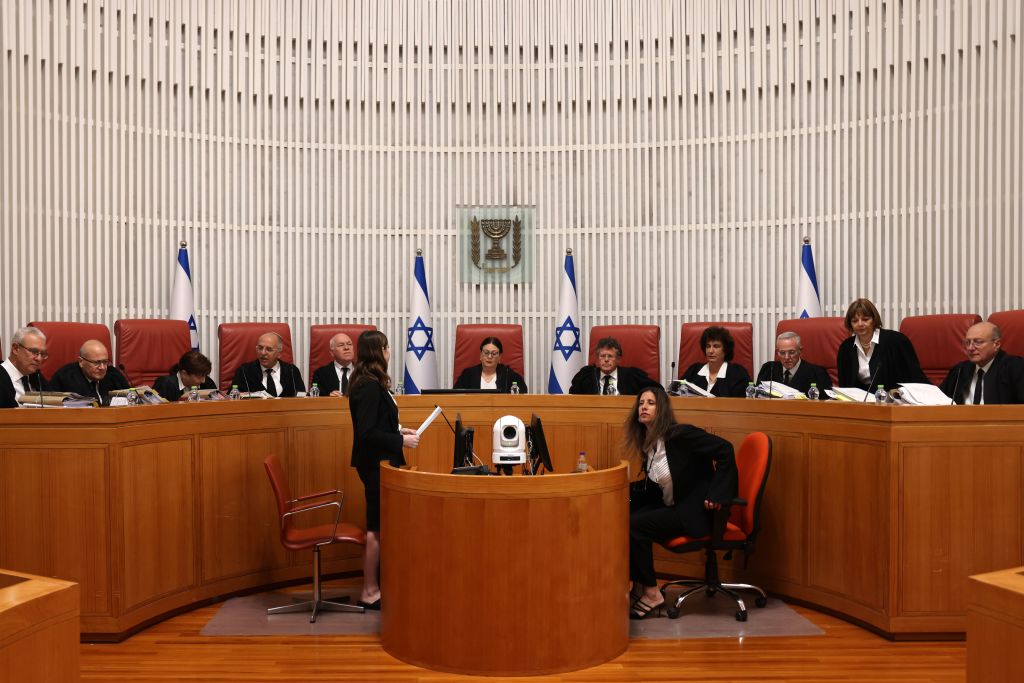
Last week, the Israeli Supreme Court ruled on two major bills pushed by Prime Minister Benjamin Netanyahu’s far-right government as part of its judicial overhaul. The decision to strike down the first and delay activation of the second until after the next general election delivered a historic victory for Israel’s democratic forces.
The first bill would have eliminated the Supreme Court’s power to block ‘extremely unreasonable’ government decisions. The second bill, explicitly tailored for Netanyahu, who currently is on trial for corruption, sought to bar Israel’s attorney-general from declaring him unfit for office if he attempts to interfere with the criminal proceedings, and stipulated that the prime minister could be declared incapacitated only for health reasons. Both bills were approved by the Knesset during the summer as amendments to Israel’s Basic Laws, which serve as the country’s de facto constitution.
These rulings mark a watershed moment for Israeli democracy. By striking down the government’s judicial overhaul, the Supreme Court rejected the notion that wartime unity necessitates tolerating Netanyahu’s erosion of democratic norms. In a narrow 8–7 majority, the court upheld the reasonableness standard, rebuking the ruling coalition for causing ‘severe and unprecedented harm’ to Israel’s democratic character.
Moreover, 12 of the 15 justices ruled that the Supreme Court has the authority to review and even strike down Basic Laws that undermine Israel’s identity as a Jewish and democratic state. This amounts to a rejection of the government’s argument that Basic Laws should be exempt from judicial review, even if they were passed by a simple Knesset majority.
That said, the court’s decision represents a radical departure from its traditional reluctance to rule on Basic Laws. Because Israel doesn’t have a formal constitution, these laws function as a foundational legal framework, outlining the state’s responsibilities and safeguarding essential civil rights. But Netanyahu’s government has exploited the court’s non-interference policy, seizing every opportunity to manipulate the Basic Law process for Netanyahu’s personal and political gain. With their latest ruling, the justices aim to end this practice.
The court’s decision to overturn Netanyahu’s judicial overhaul also represents a major victory for the hundreds of thousands of Israelis who took to the streets over the past year to protest against it. These mass rallies have highlighted the ongoing conflict between two contrasting visions of Israel’s future, a divide that was momentarily overshadowed by Hamas’s massacre of Israeli citizens on 7 October. Since the war in Gaza began, Netanyahu and his allies, whose negligence led to the worst terrorist attack in Israeli history, have tried to shift the blame to the protesters and the Supreme Court. By exposing Israel’s internal rifts, they argue, the protesters inadvertently encouraged Hamas to attack.
But it is abundantly clear that it was the government’s judicial overhaul, not the protests against it, that ripped apart Israeli society. Nevertheless, Netanyahu’s allies—including National Security Minister Itamar Ben-Gvir, whose far-right settler constituency has been the driving force behind the efforts to weaken the judiciary—have lashed out at the court for ‘weakening the spirit’ of the soldiers fighting in Gaza.
Netanyahu, for his part, seems to view the war against Hamas as an insurance policy of sorts. His management of the war is inextricably tied to his quest for political survival, reflecting his apparent conviction that the only way to mitigate the adverse repercussions of his divisive judicial overhaul and his personal responsibility for the7 October attack is by pursuing a decisive victory over Hamas, no matter the cost.
Netanyahu’s desire to save his political career also explains his refusal to accept responsibility for the blunders that have led to Israel’s current predicament. The military’s top brass, from the chief of staff to the heads of military intelligence and the Israeli security service (Shin Bet), have all acknowledged their failures and pledged to resign once the war is over. But Netanyahu, who once stated that a strong Hamas in Gaza is ‘our way to thwart the creation of a Palestinian state’, continues to evade responsibility by repeating his newfound mantra: ‘After the war.’
Before 7 October, many military reservists and combat pilots actively participated in the mass protests against the government’s judicial overhaul. Some even threatened to stop reporting for duty. While they were primarily motivated by their concern for Israel’s democracy, they also understood, as military personnel, that an independent and internationally respected judiciary safeguards them against potential prosecution by international tribunals. Regrettably, it didn’t take long for these reservists’ worst fears to materialise.
The devastating human toll of the war in Gaza has exposed Israeli leaders and soldiers to the risk of prosecution for war crimes. Later this month, the International Court of Justice in The Hague is scheduled to discuss the genocide allegations brought against Israel by South Africa. In its defence, Israel is expected to brush off the savage threats and genocidal rhetoric used by Netanyahu’s coalition partners (which have bolstered South Africa’s accusations) and highlight the international standing of the Supreme Court.
While Netanyahu’s attempted judicial coup has been thwarted, this victory could prove fleeting. Netanyahu’s coalition of warmongers, messianic settlers and cynical opportunists remains intact and will continue to pursue its authoritarian agenda. Moreover, the liberal Supreme Court majority that overturned the government’s overhaul no longer exists following the retirement of Chief Justice Esther Hayut and Justice Anat Baron.
The significance of the Supreme Court’s landmark decision, especially in the midst of an existential war, cannot be overstated. The court’s liberal-leaning majority has proven to be an indispensable ally of the democratic forces opposing the extremists who view the war in Gaza as an opportunity to realise their vision of a Greater Israel from the Mediterranean to the Jordan River. But these forces’ recent victory is merely part of a larger battle for Israel’s soul—a battle that continues to play out in the shadow of an ongoing war.

